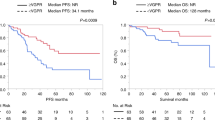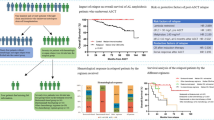Abstract
Autologous stem cell transplantation (ASCT) is an important treatment modality in light chain (AL) amyloidosis. Use of reduced-dose melphalan conditioning is common, given the associated organ and functional decline. The impact of full-intensity melphalan conditioning (n=314) was compared to reduced-dose conditioning (n=143). Patients in the full-intensity group were younger, with better performance status, fewer involved organs, lower tumor burden and lower Mayo stage. Full-dose conditioning was associated with higher rate of very good partial response or better (79% vs 62%; P<0.001), complete response rate (53% vs 37%; P=0.003) and organ response rate (74% vs 59%; P=0.002) as compared to reduced-dose conditioning. PFS was superior in the full-intensity group compared to the reduced-dose group (4-year PFS 55% vs 31%; P<0.001) as well as a longer overall survival (OS) 4-year OS (86% vs 54%; P<0.001). In addition, the OS and PFS were significantly lower in the reduced-dose group compared to the full-intensity group in Mayo stage III/IV as well as stage I/II. A multivariate analysis confirmed an independent impact for conditioning dose on PFS/OS. This study calls for re-assessment of the use of reduced-dose conditioning in ASCT for AL amyloidosis.
This is a preview of subscription content, access via your institution
Access options
Subscribe to this journal
Receive 12 print issues and online access
$259.00 per year
only $21.58 per issue
Buy this article
- Purchase on Springer Link
- Instant access to full article PDF
Prices may be subject to local taxes which are calculated during checkout



Similar content being viewed by others
References
Comenzo RL, Vosburgh E, Simms RW, Bergethon P, Sarnacki D, Finn K et al. Dose-intensive melphalan with blood stem cell support for the treatment of AL amyloidosis: one-year follow-up in five patients. Blood 1996; 88: 2801–2806.
Majolino I, Marceno R, Pecoraro G, Scime R, Vasta S, Liberti G et al. High-dose therapy and autologous transplantation in amyloidosis-AL. Haematologica 1993; 78: 68–71.
Cibeira MT, Sanchorawala V, Seldin DC, Quillen K, Berk JL, Dember LM et al. Outcome of AL amyloidosis after high-dose melphalan and autologous stem cell transplantation: long-term results in a series of 421 patients. Blood 2011; 118: 4346–4352.
Cordes S, Dispenzieri A, Lacy MQ, Hayman SR, Buadi FK, Dingli D et al. Ten-year survival after autologous stem cell transplantation for immunoglobulin light chain amyloidosis. Cancer 2012; 118: 6105–6109.
Dispenzieri A, Seenithamby K, Lacy MQ, Kumar SK, Buadi FK, Hayman SR et al. Patients with immunoglobulin light chain amyloidosis undergoing autologous stem cell transplantation have superior outcomes compared with patients with multiple myeloma: a retrospective review from a tertiary referral center. Bone Marrow Transplant 2013; 48: 1302–1307.
Gertz MA, Lacy MQ, Dispenzieri A, Kumar SK, Buadi FK, Dingli D et al. Trends in day 100 and 2-year survival after auto-SCT for AL amyloidosis: outcomes before and after 2006. Bone Marrow Transplant 2011; 46: 970–975.
Skinner M, Sanchorawala V, Seldin DC, Dember LM, Falk RH, Berk JL et al. High-dose melphalan and autologous stem-cell transplantation in patients with AL amyloidosis: an 8-year study. Ann Intern Med 2004; 140: 85–93.
D'Souza A, Dispenzieri A, Wirk B, Zhang MJ, Huang J, Gertz MA et al. Improved outcomes after autologous hematopoietic cell transplantation for light chain amyloidosis: a center for international blood and marrow transplant research study. J Clin Oncol 2015; 33: 3741–3749.
Gertz MA, Lacy MQ, Dispenzieri A, Ansell SM, Elliott MA, Gastineau DA et al. Risk-adjusted manipulation of melphalan dose before stem cell transplantation in patients with amyloidosis is associated with a lower response rate. Bone Marrow Transplant 2004; 34: 1025–1031.
Gertz MA, Comenzo R, Falk RH, Fermand JP, Hazenberg BP, Hawkins PN et al. Definition of organ involvement and treatment response in immunoglobulin light chain amyloidosis (AL): a consensus opinion from the 10th International Symposium on Amyloid and Amyloidosis, Tours, France, 18–22 April 2004. Am J Hematol 2005; 79: 319–328.
Dispenzieri A, Gertz MA, Kyle RA, Lacy MQ, Burritt MF, Therneau TM et al. Prognostication of survival using cardiac troponins and N-terminal pro-brain natriuretic peptide in patients with primary systemic amyloidosis undergoing peripheral blood stem cell transplantation. Blood 2004; 104: 1881–1887.
Kumar S, Dispenzieri A, Lacy MQ, Hayman SR, Buadi FK, Colby C et al. Revised prognostic staging system for light chain amyloidosis incorporating cardiac biomarkers and serum free light chain measurements. J Clin Oncol 2012; 30: 989–995.
Comenzo RL, Reece D, Palladini G, Seldin D, Sanchorawala V, Landau H et al. Consensus guidelines for the conduct and reporting of clinical trials in systemic light-chain amyloidosis. Leukemia 2012; 26: 2317–2325.
Karnofsky DA . The clinical evaluation of chemotherapeutic agents in cancer. Evaluation of Chemotheraputic Agents. Columbia University Press: New York, NY, USA, 1949.
Badros A, Barlogie B, Siegel E, Roberts J, Langmaid C, Zangari M et al. Results of autologous stem cell transplant in multiple myeloma patients with renal failure. Br J Haematol 2001; 114: 822–829.
Bochtler T, Hegenbart U, Kunz C, Benner A, Kimmich C, Seckinger A et al. Prognostic impact of cytogenetic aberrations in AL amyloidosis patients after high-dose melphalan: a long-term follow-up study. Blood 2016; 128: 594–602.
Bochtler T, Hegenbart U, Kunz C, Granzow M, Benner A, Seckinger A et al. Translocation t(11;14) is associated with adverse outcome in patients with newly diagnosed AL amyloidosis when treated with bortezomib-based regimens. J Clin Oncol 2015; 33: 1371–1378.
Muchtar E, Dispenzieri A, Kumar SK, Ketterling RP, Dingli D, Lacy MQ et al. Interphase fluorescence in-situ hybridization (iFISH) in untreated AL amyloidosis has an independent prognostic impact by abnormality type and treatment category. Leukemia (e-pub ahead of print 16 December 2016; doi:10.1038/leu.2016.369).
Hwa YL, Kumar SK, Gertz MA, Lacy MQ, Buadi FK, Kourelis TV et al. Induction therapy pre-autologous stem cell transplantation in immunoglobulin light chain amyloidosis: a retrospective evaluation. Am J Hematol 2016; 91: 984–988.
Alegre A, Diaz-Mediavilla J, San-Miguel J, Martinez R, Garcia Larana J, Sureda A et al. Autologous peripheral blood stem cell transplantation for multiple myeloma: a report of 259 cases from the Spanish Registry. Spanish Registry for Transplant in MM (Grupo Espanol de Trasplante Hematopoyetico-GETH) and PETHEMA. Bone Marrow Transplant 1998; 21: 133–140.
Lebovic D, Hoffman J, Levine BM, Hassoun H, Landau H, Goldsmith Y et al. Predictors of survival in patients with systemic light-chain amyloidosis and cardiac involvement initially ineligible for stem cell transplantation and treated with oral melphalan and dexamethasone. Br J Haematol 2008; 143: 369–373.
Mougenot P, Pinguet F, Fabbro M, Culine S, Poujol S, Astre C et al. Population pharmacokinetics of melphalan, infused over a 24-hour period, in patients with advanced malignancies. Cancer Chemother Pharmacol 2004; 53: 503–512.
Vokurka S, Bystricka E, Koza V, Scudlova J, Pavlicova V, Valentova D et al. Higher incidence of chemotherapy induced oral mucositis in females: a supplement of multivariate analysis to a randomized multicentre study. Support Care Cancer 2006; 14: 974–976.
Pal SK, Hurria A . Impact of age, sex, and comorbidity on cancer therapy and disease progression. J Clin Oncol 2010; 28: 4086–4093.
Acknowledgements
Author contributions
NT, EM, MAG and SKK designed the study, collected the data, analyzed the data, wrote the first draft and approved the final version of the manuscript; SS, AD, MQL, DD, FKB, SRH, WJH, WG, RW, TVK, NL and PK provided patient management, critically reviewed the first draft and approved the final version of the manuscript; and RC provided critical review and approved the final version of the manuscript.
Author information
Authors and Affiliations
Corresponding author
Ethics declarations
Competing interests
Angela Dispenzieri: Celgene Corp. (research funding), Millennium Pharmaceuticals Inc. (research funding), Pfizer Inc. (travel grant) and Janssen Pharmaceuticals Inc. (research funding), MQL: Celgene Corp. (research funding), DD: Karyopharm Therapeutics (research funding), Amgen Inc. (research funding), Millenium Pharmaceuticals (Research funding). PK: Millennium Pharmaceuticals Inc. (Takeda Pharmaceutical Co. Limited; research funding), Celgene Corp. (research funding) and Onyx Pharmaceuticals Inc. (Amgen Inc.; research funding). MAG: Celgene Corp. (Honoraria), Millennium Pharmaceuticals Inc. (Consultancy and Honoraria), Onyx Pharmaceuticals Inc. (Honoraria), Novartis (Honoraria), Smith Kline (Honoraria), Prothena (Honoraria), Ionis (Honoraria), Amgen Inc. (Honoraria). SKK: Celgene Corp. (consultancy and research funding), Millennium Pharmaceuticals Inc. (consultancy and research funding), Novartis (research funding), Onyx Pharmaceuticals Inc. (consultancy and research funding), AbbVie (research funding), Janssen (consultancy and research funding), BMS (consultancy and research funding). The remaining authors declare no conflict of interest.
Additional information
Supplementary Information accompanies this paper on Bone Marrow Transplantation website
Supplementary information
Rights and permissions
About this article
Cite this article
Tandon, N., Muchtar, E., Sidana, S. et al. Revisiting conditioning dose in newly diagnosed light chain amyloidosis undergoing frontline autologous stem cell transplant: impact on response and survival. Bone Marrow Transplant 52, 1126–1132 (2017). https://doi.org/10.1038/bmt.2017.68
Received:
Revised:
Accepted:
Published:
Issue Date:
DOI: https://doi.org/10.1038/bmt.2017.68
This article is cited by
-
Risk factors, treatments and outcomes of patients with light chain amyloidosis who relapse after autologous stem cell transplantation
Bone Marrow Transplantation (2024)
-
Comprehensive Review of AL amyloidosis: some practical recommendations
Blood Cancer Journal (2021)
-
Autologous stem cell transplantation in light-chain amyloidosis
memo - Magazine of European Medical Oncology (2021)
-
Systemic immunoglobulin light chain amyloidosis
Nature Reviews Disease Primers (2018)



